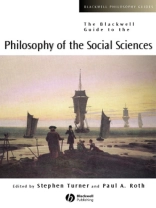The Blackwell Guide to the Philosophy of the Social Sciences collects newly commissioned essays that examine fundamental issues in the social sciences.
表中的内容
Notes on Contributors.
Introduction: Ghosts and the Machine: Issues of Agency,
Rationality, and Scientific Methodology in Contemporary Philosophy
of Social Science. (Stephen P. Turner and Paul A. Roth).
Part I: Pasts.
1. Cause, the Persistence of Teleology, and the Origins of the
Philosophy of Social Science. (Stephen P. Turner).
2. Phenomenology and Social Inquiry: From Consciousness to
Culture and Critique.( Brian Fay).
3. Twentieth-century Philosophy of Social Science in the
Analytic Tradition. (Thomas Uebel).
Part II: Programs.:.
4. Critical Theory as Practical Knowledge: Participants,
Observers and Critics. (James Bohman).
5. Decision Theory and Degree of Belief. (Piers Rawling).
6. The Methodology of Rational Choice. (Lars Udehn).
7. Mathematical Modeling in the Social Sciences. (Paul
Humphreys).
8. The Practical Turn. (David Stern).
9. Science & Technology Studies and the Philosophy of Social
Sciences. (Steve Fuller).
Part III: Problematics.
10. ‘See Also Literary Criticism’: Social Science Between Fact
and Figures. (Hans Kellner).
11. The Descent of Evolutionary Explanations: Darwinian Vestiges
in the Social Sciences. (Lynn Hankinson Nelson).
12. How Standpoint Methodology Informs Philosophy of Social
Science. (Sandra Harding).
13. Beyond Understanding: The Career of the Concept of
Understanding in the Human Sciences. (Paul A. Roth).
Bibliography.
Index.
关于作者
Stephen P. Turner is Graduate Research Professor and Chair
of the Department of Philosophy at the University of South Florida.
He is the author of many books including Sociological
Explanation as Translation (1980). He is also editor of the
Cambridge Companion to Max Weber (2000).
Paul A. Roth is Professor of Philosophy at the University
of Missouri-St. Louis. He is the author of Meaning and Method in
the Social Sciences (1987). He co-founded and co-organizes the
annual St. Louis Roundtable in the Philosophy of Social Science and
is a member of the editorial board of Philosophy of the Social
Sciences.












